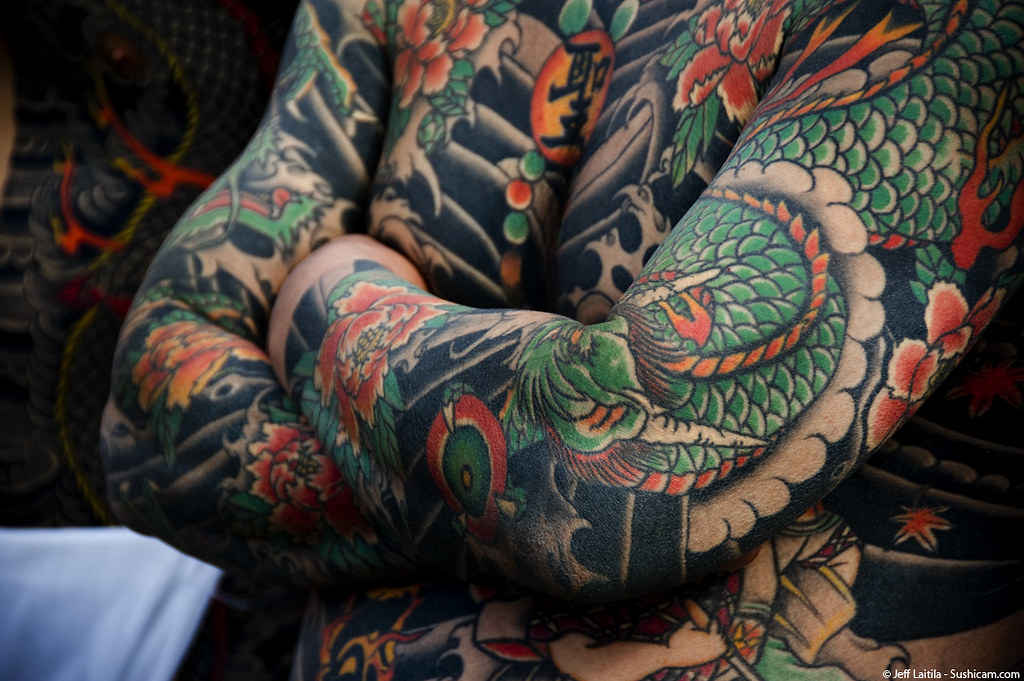Tattoos in Japan carry a unique cultural significance, blending history, art, and social perception. While they aren’t illegal, their association with the yakuza has long influenced public attitudes. For travelers, this can mean encountering restrictions at places like traditional bathhouses, pools, or even gyms. Yet, Japan’s growing global influence and younger generations’ shifting views are slowly reshaping this narrative. If you’re wondering how your ink might affect your trip, we’ll guide you through the must-knows for navigating tattoo etiquette and finding tattoo-friendly spaces.
The Historical Significance of Tattoos in Japan
Japan’s tattoo culture is steeped in a history that intertwines with both art and society. From ancient practices to associations with the underworld, tattoos in Japan have carried a range of meanings. Understanding this history reveals why tattoos are both revered and misunderstood in modern Japanese culture.
Tattoos and the Japanese Yakuza
Tattoos in Japan became closely linked with the Yakuza, Japan’s organized crime syndicate, during the 20th century. Yakuza members adopted tattoos as a mark of loyalty and toughness, often covering their entire bodies with intricate designs called “bodysuits.” These tattoos weren’t just decorative—they symbolized a member’s allegiance to their clan, their rank, and their resilience to endure the slow and painful tattooing process.
The Yakuza’s use of tattoos has had a lasting impact on Japanese society. Many people still associate ink with criminality, leading to widespread stigma. Public spaces like sentō (bathhouses) and onsen (hot springs) often ban patrons with visible tattoos because of this historical connection. These restrictions are still in place even as younger generations begin to challenge and reshape these perceptions.
For a deeper dive into the historical ties between tattoos and the Yakuza, you can read more on the BBC’s explanation of how tattoos became tied to the Yakuza.
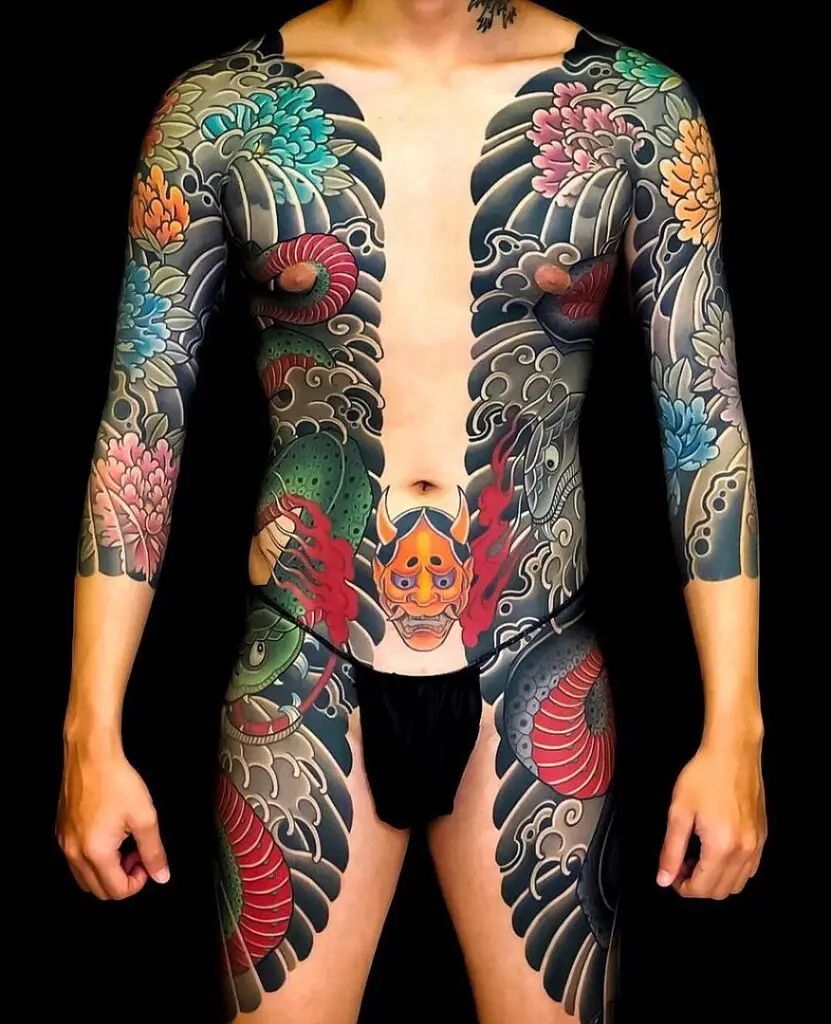
Traditional Tattoo Art in Japan
Irezumi, the traditional method of Japanese tattooing, stands out as a striking art form. The word “Irezumi” translates to “inserting ink,” and this style features large, colorful designs inspired by mythology, folklore, and nature. Common motifs include dragons, koi fish, cherry blossoms, and fierce samurai warriors.
Historically, Irezumi had a complex societal role. During the Edo Period (1603-1868), tattoos were used to mark criminals as a form of punishment. However, as time went on, these markings evolved into decorative body art, admired for their craftsmanship and intricate detail. Despite this change, tattoos remained controversial. The government banned them in the 19th century as Japan sought to modernize and align with Western norms. Even today, Irezumi remains a niche but highly respected art form among tattoo enthusiasts.
To learn more about the origins and evolution of Irezumi, check out My Modern Met’s exploration of traditional Japanese tattoos.
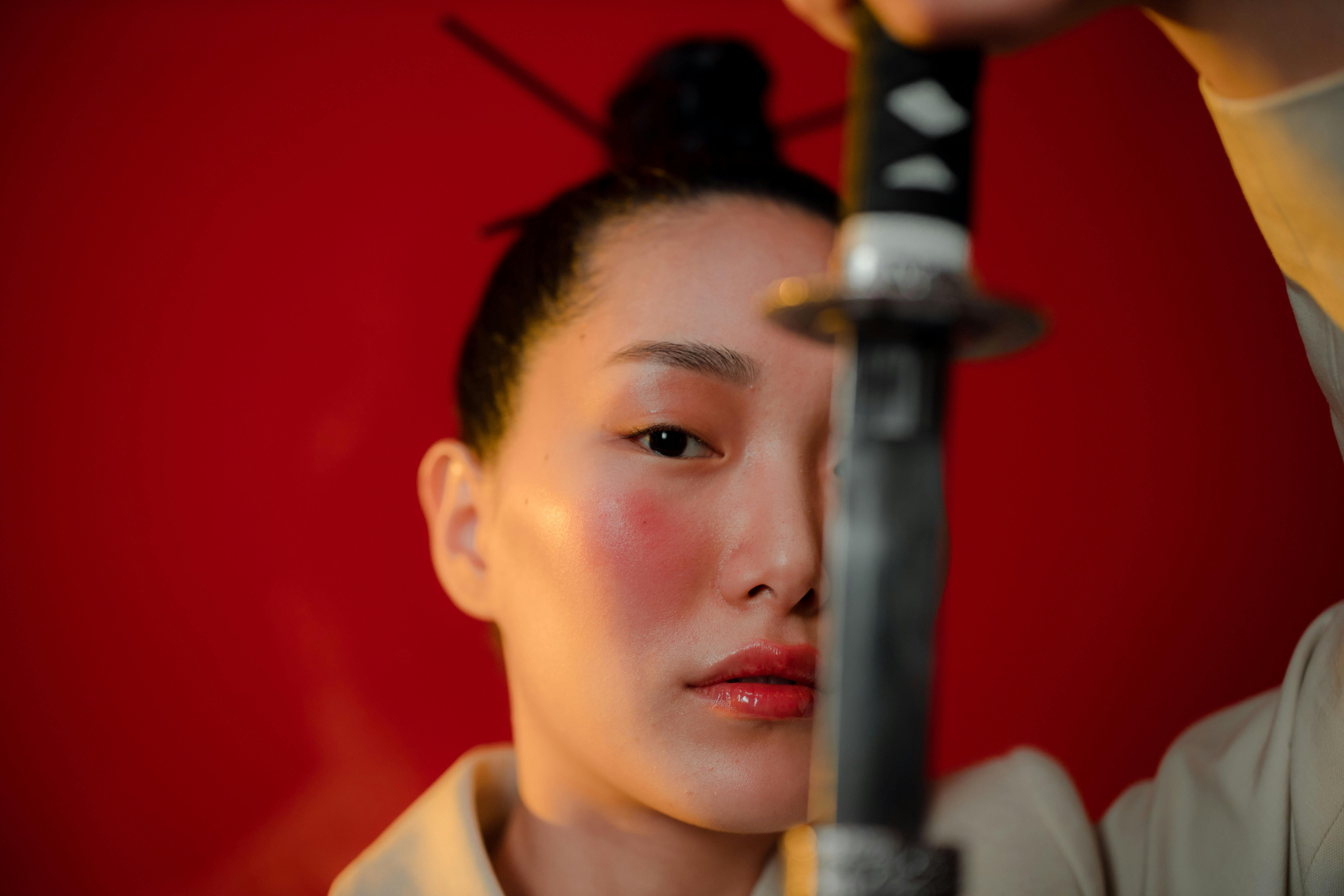
Photo by cottonbro studio
Modern Attitudes Toward Tattoos in Japan
In recent years, Japan has experienced a subtle yet significant shift in its perception of tattoos. What was once strongly tied to criminality is now slowly taking on more nuanced meanings, particularly among younger generations and through the lens of popular culture.
Changing Perspectives Among Youth
Younger generations in Japan are showing greater openness toward tattoos compared to their parents and grandparents. While traditional views linger, a growing number of young people see tattoos as a form of self-expression rather than a sign of rebellion or association with criminal groups. This generational divide is shaping a new narrative about tattoos in Japan.
According to a survey by YouGov, nearly 30% of young Japanese adults under the age of 30 regard tattoos as “fashionable” or “artistic.” In contrast, only about 10% of people over 50 share this sentiment. Major cities like Tokyo and Osaka often reflect this trend, where younger residents sport tattoos with pride and are less likely to face judgment when compared to rural areas.
This changing attitude is also influenced by global trends and the increasing exposure to Western cultures. With social media, it’s easier than ever for young people to admire and replicate tattoo styles from abroad, breaking free from entrenched social norms. Are tattoos becoming mainstream in Japan? Not quite yet—but it’s clear the stigma is starting to fade, at least among the younger crowd.
The Role of Popular Culture
Popular culture in Japan has played a pivotal role in softening the general perception of tattoos. Celebrities, both local and international, are often seen with tattoos, offering examples of ink as something aspirational rather than taboo. J-Pop idols, actors, and social media influencers are normalizing body art, though they still tread cautiously to avoid alienating more traditional fan bases.
Anime and manga have also contributed significantly to this shift. Iconic series featuring heavily tattooed characters—such as “One Piece” or “Tokyo Revengers”—have painted tattoos as symbols of strength, individuality, or artistry. This representation resonates strongly with younger audiences, further breaking down lasting stereotypes.
For instance, Western fans of Japanese animation often honor their favorite series with anime-themed tattoos, a trend that eventually made its way back to Japan. Inkcredible Tattoo reported a growing demand for anime-style tattoos globally, showcasing how Japan’s own art forms are influencing its domestic tattoo culture.
Additionally, tattoo exhibitions and conventions have emerged in urban hubs, blending subculture and mainstream appeal. Events like “Ota-Tattoo Night” celebrate tattoos as a communal art form, welcoming enthusiasts from all walks of life. This intersection of media and art is steadily engraving tattoos into the cultural consciousness of modern Japan.
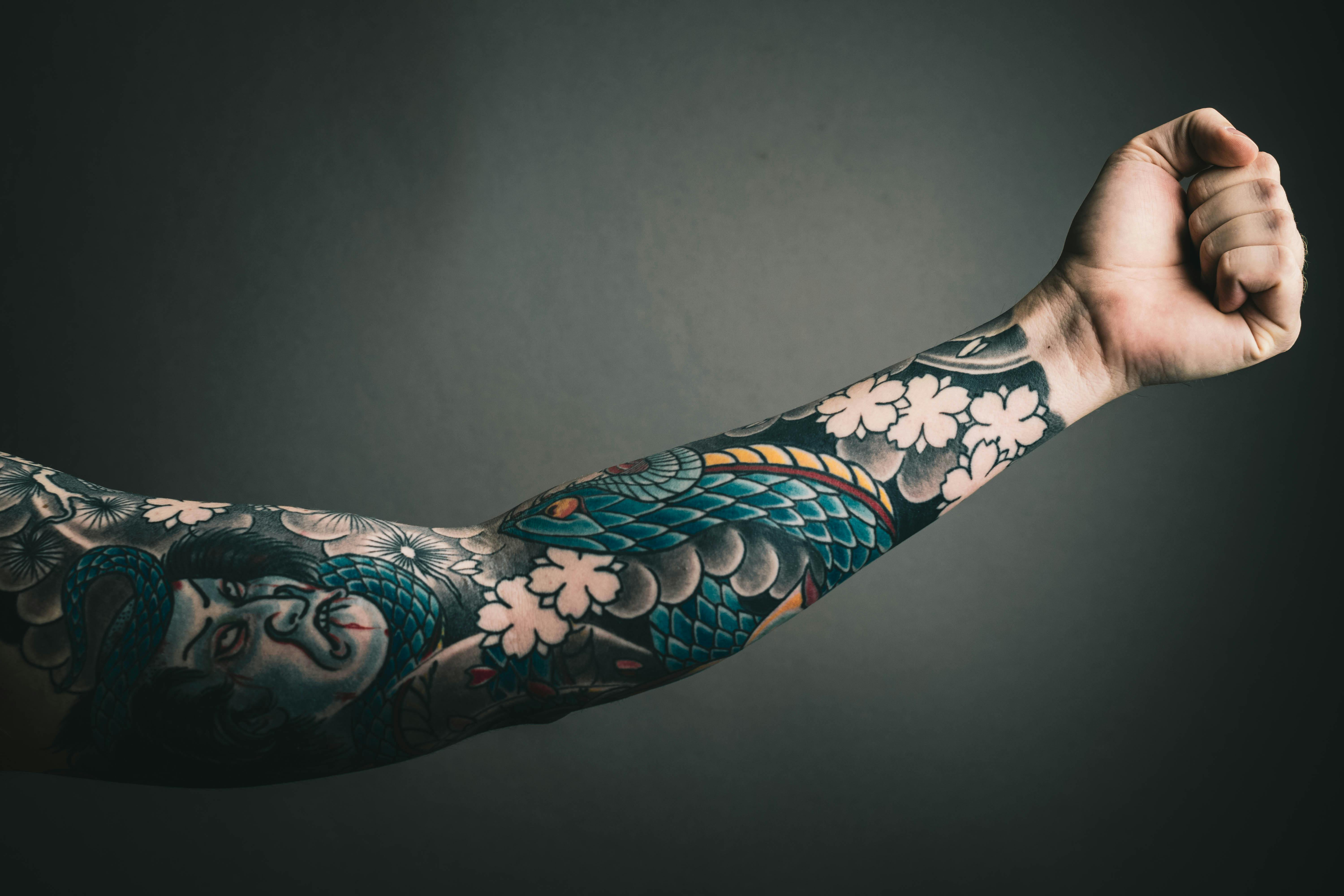
Photo by Kevin Bidwell
For more on how anime and media shape tattoo culture, explore this piece on Anime’s Influence on Japanese Tattoo Trends. This dynamic blend of modernity and tradition makes tattoos in Japan an intriguing topic, especially for travelers seeking to understand the evolving attitudes in the country.
Legal and Social Restrictions on Tattoos
Traveling to Japan with tattoos can create unique challenges due to cultural and social perceptions that distinguish Japan from many other countries. While tattoos are not legally banned, their historical associations still create a complex environment, particularly in public spaces. Understanding these restrictions can help travelers navigate the country with ease and respect.
Onsen and Sento Policies
Japan’s affection for its traditional public baths (onsen and sento) is undeniable. These spaces are cherished for relaxation and ritual hygiene. However, they are also the most challenging places for tattooed individuals. Many establishments still enforce a no-tattoo policy—a result of tattoos being historically linked to the yakuza. Some onsen openly post signboards to refuse entry to tattooed customers.
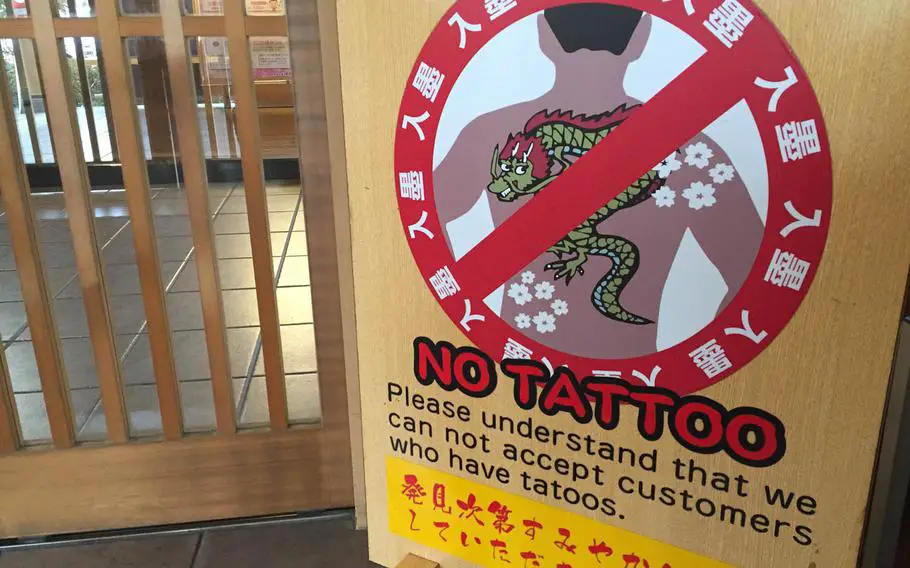
For travelers, this doesn’t mean all hope is lost. Many facilities, especially modern ones, are adapting to accommodate visitors. Here’s how you can enjoy Japan’s famous baths without stress:
- Seek tattoo-friendly locations: Some onsen and sento specifically allow tattooed individuals. Here’s a list of tattoo-friendly onsen in Japan.
- Use private baths: Select ryokan (traditional inns) or resorts offer private onsen, where you can enjoy the experience without public scrutiny.
- Cover your tattoos: Waterproof tattoo cover stickers are widely available and typically accepted at some establishments. These options demonstrate respect for their rules.
Respecting these customs ensures a better experience and helps international visitors blend harmoniously with Japanese culture. For more details, you can explore more options on finding tattoo-friendly onsen.
Guidelines for Travelers with Tattoos
If you plan to explore Japan as a tattooed traveler, preparation is key to minimizing discomfort or awkward situations. Here are practical tips:
- Research ahead: Before visiting onsen, gyms, or swimming pools, check for tattoo policies. Websites like Voyapon provide guides for tattooed travelers.
- Carry a cover-up: Long sleeves, scarves, or adhesive tattoo covers can be lifesavers in more traditional areas.
- Respect social norms: Although tattoos may not attract attention in big cities like Tokyo, rural areas tend to cling to traditional values. Be mindful of their customs.
- Consider cultural sensitivity: Even if some locals are curious about your tattoos, always respond kindly. Tattoos hold a different weight in Japan, and understanding that cultural distinction reflects positively on you as a visitor.
Traveling with tattoos in Japan doesn’t mean you’ll be severely limited, but navigating around these challenges with cultural awareness is essential. For a thorough guide, check out travel tips for tattooed visitors.
Tattoo-Friendly Alternatives in Japan
Navigating Japan as a tattooed traveler can be easier when you know where to look. While traditional stigmas around tattoos may still exist, plenty of options are opening up to welcome visitors with ink. Whether you’re exploring vibrant cities or tranquil countryside, these alternatives ensure you can enjoy Japan without worry.
Finding Tattoo-Friendly Options
Technology can be your best friend when searching for tattoo-friendly spots. Various websites and apps make it simple to locate businesses ready to welcome tattooed guests. Platforms like Tattoo Friendly Japan offer maps and lists of venues, including onsen, sento, gyms, and even hotels, where tattoos are accepted.
For quick recommendations, online travel forums such as Reddit’s Japan Travel Tips section are filled with firsthand advice from travelers who’ve been in your shoes. Apps that cater to tourists like Google Maps and travel platforms also highlight user reviews that mention tattoo policies. By taking a few minutes to browse these digital tools, you avoid the discomfort of being turned away.
Some online guides even categorize tattoo-friendly destinations by region. For example, see GaijinPot’s guide to 30 tattoo-friendly onsen to find welcoming hot springs across Japan.
Private Onsen and Ryokan
If you’re looking for a truly relaxing experience, consider booking a private onsen or a stay at a tattoo-friendly ryokan. These options ensure privacy and comfort while letting you immerse yourself in Japan’s traditional hospitality.
Private onsen accommodations are perfect for travelers who want to enjoy Japan’s famous hot springs without restrictions. Many ryokan (traditional inns) offer baths attached to your room or rentable private baths, so you won’t need to worry about tattoo policies. A few stand-out options include Shima Onsen Kashiwaya Ryokan, which combines authentic Japanese charm with tattoo-friendly hospitality.
For a convenient breakdown of available spots, Japanese Onsen’s list of tattoo-friendly ryokan highlights exceptional venues across the country. From the tranquil waters of Kinosaki Onsen to luxurious retreats in Hakone, private bath options offer unforgettable serenity without limitations.
Alternatively, some popular public onsen are easing their rules and openly welcome tattooed guests. Resorts like Kusatsu Onsen and others noted on resources like Japan Travel’s tattoo-friendly onsen guide highlight changing attitudes across the country.
By researching ahead of time, you can enjoy worry-free relaxation and embrace Japan’s rich bathing culture. Whether it’s a tranquil escape at a ryokan or a private soak in a secluded onsen, these choices ensure you’re never left feeling left out.
The Future of Tattoos in Japan
Japan’s cultural perspective on tattoos has seen steady change over the years, and the future promises even greater shifts. With influences from globalization and policy adaptations, tattoos may eventually become a more common and accepted part of Japanese society.
Influence of Globalization

Photo by Lance Reis
Tourism, international media, and digital platforms have been pivotal in softening traditional societal norms regarding tattoos in Japan. Over the last decade, Japan has experienced a surge in foreign visitors, many of whom arrive with inked skin. As more tourists flock to the country—especially in preparation for upcoming international events—local accommodations, restaurants, and even traditional onsen are rethinking their tattoo policies. What once was a hard-and-fast “no tattoos allowed” rule is now gradually transforming to accommodate diverse cultural norms.
Social media also plays a huge role in shaping opinions. Platforms like TikTok, Instagram, and YouTube showcase beautiful tattoo art and tattoo-friendly destinations in Japan, erasing some of the fear or judgment that locals used to feel. Unique hashtags like #JapanInk or #InkedInAsia provide tattoo enthusiasts worldwide a peek into Japanese tattoo culture while portraying it as less intimidating.
The global acceptance of tattoos, combined with cultural exchanges through tourism, has helped several Japanese businesses shift their policies to attract international clientele. This open-mindedness, triggered by globalization, hints at a more tattoo-inclusive society in the near future.
For more on how tattoos are gradually becoming more acceptable in Japan, check out this resource.
Potential Policy Changes
The wave of modernization in Japan isn’t limited to just fashion or technology—it extends to societal rules, too. In recent years, certain hot springs, gyms, and even workplaces have started to relax restrictions on visible tattoos. A prime example is the reassessment of tattoo bans in Japan’s Defense Ministry, which, as noted by Stars and Stripes, is considering attracting young recruits with ink. This indicates a broader trend: institutions recognizing tattoos not as rebellious symbols but as personal or artistic choices.
Additionally, policies may shift further due to labor shortages. Japan’s population is aging, and younger workers—many of whom embrace a more lenient view of tattoos—might play a pivotal role in reshaping corporate hiring norms. The hospitality and entertainment industries, always eager to cater to an increasingly diverse audience, are also at the forefront of this change. Tattoo acceptance is no longer just about culture; it’s also good business.
Forward-thinking businesses and municipalities hint that we are witnessing the early phases of an era where tattoos won’t restrict opportunities or social participation in Japan. As efforts to attract international tourists and modernize traditions continue, tattoo acceptance might transform entirely.
For insights into how tattoo policies are evolving in Japan, explore Shifting Norms on Tattoos by The New York Times.
Are Tattoos Allowed in Japan? Conclusion
Tattoos in Japan exist at the crossroads of tradition and modernity. While they aren’t illegal, cultural associations often lead to restrictions at public spaces like onsen, pools, and gyms. However, younger generations and global influences are steadily challenging outdated stigmas, offering a glimpse of a more inclusive future.
Travelers with tattoos can enjoy Japan by respecting local customs and seeking tattoo-friendly locations. Researching ahead and understanding societal nuances ensures a smooth experience.
Tattoos may still raise eyebrows in some contexts, but Japan’s evolving perspectives indicate positive change is underway. For those planning to visit, preparation and cultural awareness are key to embracing all Japan has to offer.

